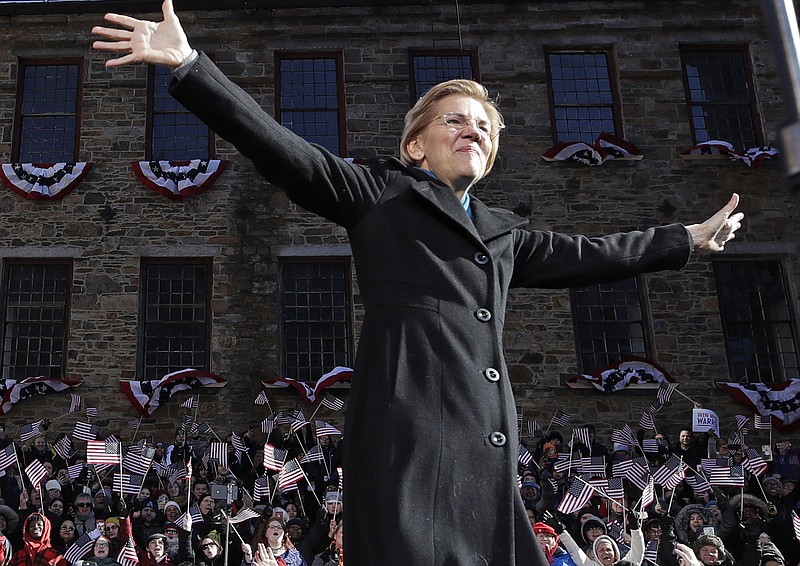Give Sen. Elizabeth Warren, D-Massachusetts, credit. Although it's 20 months until the November 2020 presidential election, she campaigned in three Southern states recently she hasn't the remotest chance of carrying if she were the Democratic nominee.
And even though her ideas aren't acceptable but to a tiny percentage of people in Tennessee, Mississippi and Alabama, she was right in there plugging them.
"This is a 50-state campaign strategy," Warren said Sunday in Memphis. "I'm running to be the president of all the people. And it's important to go around the country and have a chance to talk with people face to face."
Chances are, if she were the nominee, she wouldn't be spending a lot of time in those states in September and October of next year. She'd have to be concentrating on battleground states like Florida, Ohio, Pennsylvania, Michigan and Wisconsin.
Warren says, though, that's the problem - a small number of states shouldn't decide the election. We need to get rid of that old, nasty Electoral College.
She'd have the election decided by the popular vote, which is exactly what the Founding Fathers feared when they were writing the Constitution. They were worried about large states like Virginia, which had 19.2 percent of the country's population in 1790, and Pennsylvania, which had 11.2 percent, holding sway over small states like Delaware and Rhode Island, which had 1.5 percent each of the population.
It's the same thing today, only the large states are California, Texas, Florida and New York, with 12.13 percent, 8.75 percent, 6.5 percent and 6.06 percent of the population, respectively. Meanwhile, Vermont and Wyoming have 0.19 percent and 0.17 percent, respectively.
Each of the large states today also has a sizable percentage of illegal immigrants, who, although they don't have the right to vote (wink, wink) do count in giving the state representation in Congress. That makes the Electoral College, which awards votes on those who actually cast ballots, even more important.
Warren, in an effort to appeal to low-information voters, couches her suggestions with terms no one would oppose.
She wants a constitutional amendment protecting the right to vote and the repeal of "every" voter suppression law on the books, she said in Jackson, Mississippi, Monday.
Who wouldn't want to protect the right to vote? Who thinks voter suppression laws even should be on the books?
It's what are behind those suggestions that tell the story. In the minds of Warren and many other Democrats, voter suppression is when you have to show an ID in order to vote, when you have to be a citizen to vote, or when you can't walk off the street on Election Day to both register and vote.
In Tennessee Sunday, she also explained how she'd tax very wealthy Americans to fund universal early child care. If the thought of a socialist-minded government - if she had her way - controlling the care of your child from the ages of 0 to 5 and then from 6 to 18 isn't scary enough, the concern of very wealthy Americans running out of money would. For taxing wealthy Americans is the manner in which every far-left idea could be paid for, according to every far-left candidate.
Warren also would have the federal government spend $500 billion - by taking a larger percentage of the money the wealthy can inherit - to build affordable new houses and rehabilitate existing ones over the next decade.
Her aim, she said, is to close the racial gap on home ownership. No problem there. But the last time the federal government got so involved in how to do that, with both Democratic and Republican presidents, a little thing called the Great Recession resulted.
Nevertheless, she persisted.
In Tennessee, where automobile manufacturers employ more than 135,000 people, most of them preferably non-union, Warren suggested unions should have more power and more ability to pull in people. In Mississippi, where Obamacare has not been popular, Warren carefully avoided out-and-out espousing a full government-run health care system but suggested there were "a lot of different pathways" toward Medicare for All. And, in front of an audience healthily sprinkled with black faces, she suggested "it's time to start the national, full-blown conversation about reparations."
The Massachusetts senator, who two years ago might have been considered the Democratic front runner for the 2020 nomination, has not caught on nationally, has been heavily outraised in the early going and is known better for her Native American identification controversy.
Unfortunately - though we'll give her the Courage Award for coming into the Trump-ish South - her liberal ideas are not likely to resonate with many Middle America voters, either.
